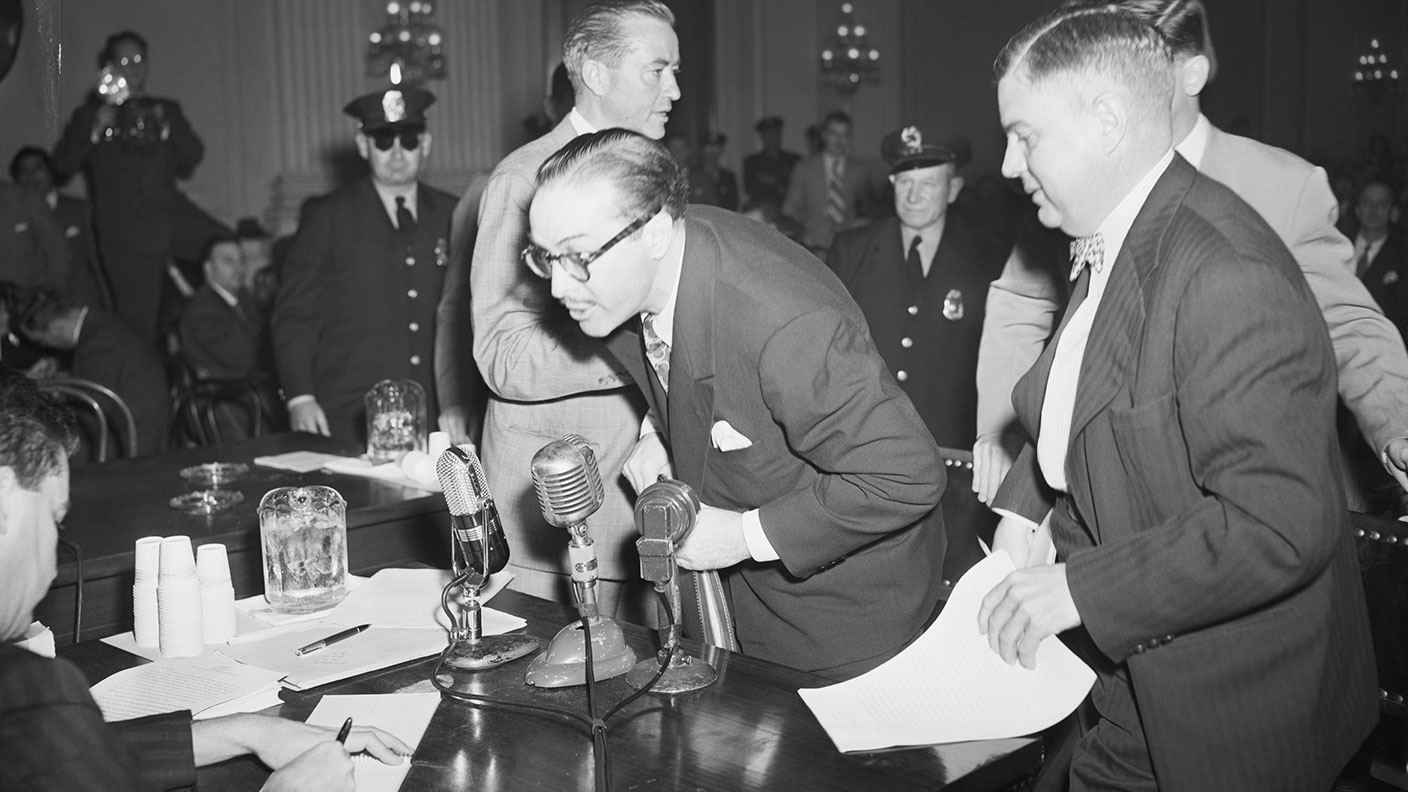25 November 1947: The “Hollywood Ten” are blacklisted
Today in 1947 ten Hollywood luminaries were blacklisted and their careers ruined after refusing to answer the questions of the House Un-American Activities Committee.


Get the latest financial news, insights and expert analysis from our award-winning MoneyWeek team, to help you understand what really matters when it comes to your finances.
You are now subscribed
Your newsletter sign-up was successful
Want to add more newsletters?

Twice daily
MoneyWeek
Get the latest financial news, insights and expert analysis from our award-winning MoneyWeek team, to help you understand what really matters when it comes to your finances.

Four times a week
Look After My Bills
Sign up to our free money-saving newsletter, filled with the latest news and expert advice to help you find the best tips and deals for managing your bills. Start saving today!
The most dangerous thing to come out of Hollywood these days is another big-budget flop or a tedious sequel. But in the years following the end of the Second World War, Tinsel Town was seen as a very dangerous place.
America's House Un-American Activities Committee was charged with investigating subversive ideology on the silver screen. It had to stop socialist propaganda from being piped into American cinemas up and down the country. Communists were everywhere. Hollywood was infested with them – all the committee needed were names. "There is no question that there are communists in Hollywood", said committee chairman Parnell Thomas. "What the committee wants to know is the extent of their infiltration into the film industry."
Over 40 actors, screen writers, directors and producers were ordered to appear before the committee for interrogation. However, ten refused, claiming their civil liberties were being trampled on – a damning indictment indeed. At the end of November 1947, Alvah Bessie, Herbert Biberman, Lester Cole, Edward Dmytryk, Ring Lardner Jr, John Howard Lawson, Albert Maltz, Samuel Ornitz, Adrian Scott and Dalton Trumbo were all cited with being in contempt of Congress. They were later fined and sentenced to a year in prison.
MoneyWeek
Subscribe to MoneyWeek today and get your first six magazine issues absolutely FREE

Sign up to Money Morning
Don't miss the latest investment and personal finances news, market analysis, plus money-saving tips with our free twice-daily newsletter
Don't miss the latest investment and personal finances news, market analysis, plus money-saving tips with our free twice-daily newsletter
The next day, the “Hollywood Ten” were blacklisted. No studio worth its salt would have anything to do with them and their careers were effectively over. Or so it was believed by the studio executives (and Dmytryk, one of the Hollywood Ten. He was released from prison early when he ratted out 20 “communists”).
Dozens of names were added to the blacklist over the next few years, but many carried on working under different names. Dalton Trumbo is perhaps the most famous example. Writing under the nom de plume Robert Rich, he won an Oscar for The Brave One in 1957. And when Trumbo was publicly acknowledged as the writer of the highly acclaimed Spartacus, starring Kirk Douglas in 1960, the witch hunt had run its course.
Get the latest financial news, insights and expert analysis from our award-winning MoneyWeek team, to help you understand what really matters when it comes to your finances.

-
 Should you buy an active ETF?
Should you buy an active ETF?ETFs are often mischaracterised as passive products, but they can be a convenient way to add active management to your portfolio
-
 Power up your pension before 5 April – easy ways to save before the tax year end
Power up your pension before 5 April – easy ways to save before the tax year endWith the end of the tax year looming, pension savers currently have a window to review and maximise what’s going into their retirement funds – we look at how
-
 31 August 1957: the Federation of Malaya declares independence from the UK
31 August 1957: the Federation of Malaya declares independence from the UKFeatures On this day in 1957, after ten years of preparation, the Federation of Malaya became an independent nation.
-
 13 April 1960: the first satellite navigation system is launched
13 April 1960: the first satellite navigation system is launchedFeatures On this day in 1960, Nasa sent the Transit 1B satellite into orbit to provide positioning for the US Navy’s fleet of Polaris ballistic missile submarines.
-
 9 April 1838: National Gallery opens in Trafalgar Square
9 April 1838: National Gallery opens in Trafalgar SquareFeatures On this day in 1838, William Wilkins’ new National Gallery building in Trafalgar Square opened to the public.
-
3 March 1962: British Antarctic Territory is created
Features On this day in 1962, Britain formed the British Antarctic Territory administered from the Falkland Islands.
-
10 March 2000: the dotcom bubble peaks
Features Tech mania fanned by the dawning of the internet age inflated the dotcom bubble to maximum extent, on this day in 2000.
-
9 March 1776: Adam Smith publishes 'The Wealth of Nations'
Features On this day in 1776, Adam Smith, the “father of modern economics”, published his hugely influential book The Wealth of Nations.
-
 8 March 1817: the New York Stock Exchange is formed
8 March 1817: the New York Stock Exchange is formedFeatures On this day in 1817, a group of brokers moved out of a New York coffee house to form what would become the biggest stock exchange in the world.
-
7 March 1969: Queen Elizabeth II officially opens the Victoria Line
Features On this day in 1969, Queen Elizabeth II took only her second trip on the tube to officially open the underground’s newest line – the Victoria Line.